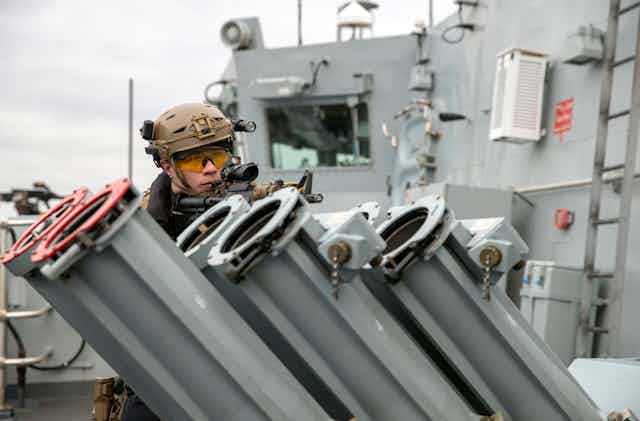Even before Boris Johnson became prime minister, the Trump administration has been on a charm offensive towards the UK and him in particular. When Britain’s Johnson met US National Security Advisor John Bolton on August 12 in London, they discussed the UK-US trading relationship, including a proposed post-Brexit free trade agreement, alongside the critical security interests that the two nations have in common.
The UK now has to make difficult choices in terms of its national interest and relations with its closest strategic partners. Both narrow national and wider international conditions and events have made this particularly tricky for the UK, especially given the overarching difficulties of Brexit and the recent change in leadership. Recent events in the Straits of Hormuz and the overall trajectory of the Iranian nuclear agreement are a case in point.
On July 4, the Iranian oil tanker Grace 1 was detained by British Royal Marines off the coast of Gibraltar on suspicion of violating EU sanctions by taking oil to Syria. On July 19, the Iranian Revolutionary Guards then seized the British-flagged ship the Stena Impero.
Read more: Iran: what the law of the sea says about detaining foreign ships in transit
These incidents and the ratcheting up of tension in the Gulf have compelled the UK to look for additional strategic partners to help safeguard shipping in that region. This is where the rubber has hit the road in terms of the nexus between the UK’s interests and strategic partnerships with both the US and its European allies.
In May 2018, the Trump administration announced that the US would pull out of the Joint Comprehensive Plan of Action (JCPOA), which sets limits on Iran’s nuclear programme to ensure that it cannot produce nuclear weapons. Until recently, the UK remained committed, along with the EU, to the JCPOA. However, Bolton’s visit to the UK was, in part, aimed at trying to persuade the UK to rethink that commitment to the nuclear deal as well as to substantiate Johnson’s recent decision to join the US naval mission Operation Sentinel to protect oil tankers in the Gulf.

Policing the Gulf
In one of his last acts as British foreign secretary, Jeremy Hunt indicated that the UK should pursue a European-led maritime security force in the Gulf. However, this was subsequently rejected by Johnson in favour of cooperation with the Americans.
To date, the Europeans, as well other US allies, remain uncommitted to joining the new task force despite recent overtures from both the US and the UK. The UK now finds itself in a difficult position between not wanting to completely renounce its commitment to the JCPOA and its post-Brexit security interests with the EU, while also looking for partners that will actually deliver on its requirement to bulk-up protection of shipping in the straits.
As expected in the current politically polarised UK context, there are varying attitudes and opinions on how the UK should navigate this challenge. There are those who argue that both the UK and the EU (and even the US) are all in weaker international positions and this is just one example that exposes that reality.
Some analysts have argued that Britain’s weakness and preoccupation with Brexit, Europe’s lack of strategic foresight and defense capabilities, and a transatlantic relationship struggling to find common ground are all exposing frailties in the wider US-UK relationship. Others have proposed a two-track approach for the UK to boost the Royal Navy and move towards the US position on Iran – and the JCPOA in particular.
Naval strength
What’s clear is that the UK will still have to invest in its own naval capabilities if it wants to safeguard shipping in the Gulf whether independently or through multilateral missions. In July, US Secretary of State Mike Pompeo warned the UK that the responsibility falls to the UK to take care of its ships.
So what is the UK’s capacity to do this? Currently, the Royal Navy has fewer than 80 ships and is at about half of the capacity it was during the Falklands War. This is partly because the Royal Navy pursued a strategy of replacing capacity with high-end capability; the US Navy has taken a similar path, though it started from a much stronger position. However, for the UK, this has led to a need to strike a balance between those capacities necessary to win wars and to preserve peace. Protecting routine maritime shipping very much falls into the latter category.
The UK approach is purposefully designed to plug into US operational capacity in times of crisis management operations or great power conflicts. The force is set up to support a carrier strike-group and not to patrol global shipping routes.
It remains to be seen whether Johnson will be open to investing the required capital to grow the Royal Navy substantially. He certainly seems ready to work more closely with the Americans in the Gulf. However, the long-term shape of the UK-EU security partnership as well as UK bilateral cooperation with the larger European military powers will reveal itself in time.
This will only be determined by the circumstances and attitudes surrounding Brexit and the ability to repair the current fractures in the wider transatlantic relationship – and not just on what particular maritime task force the UK decides to contribute.

